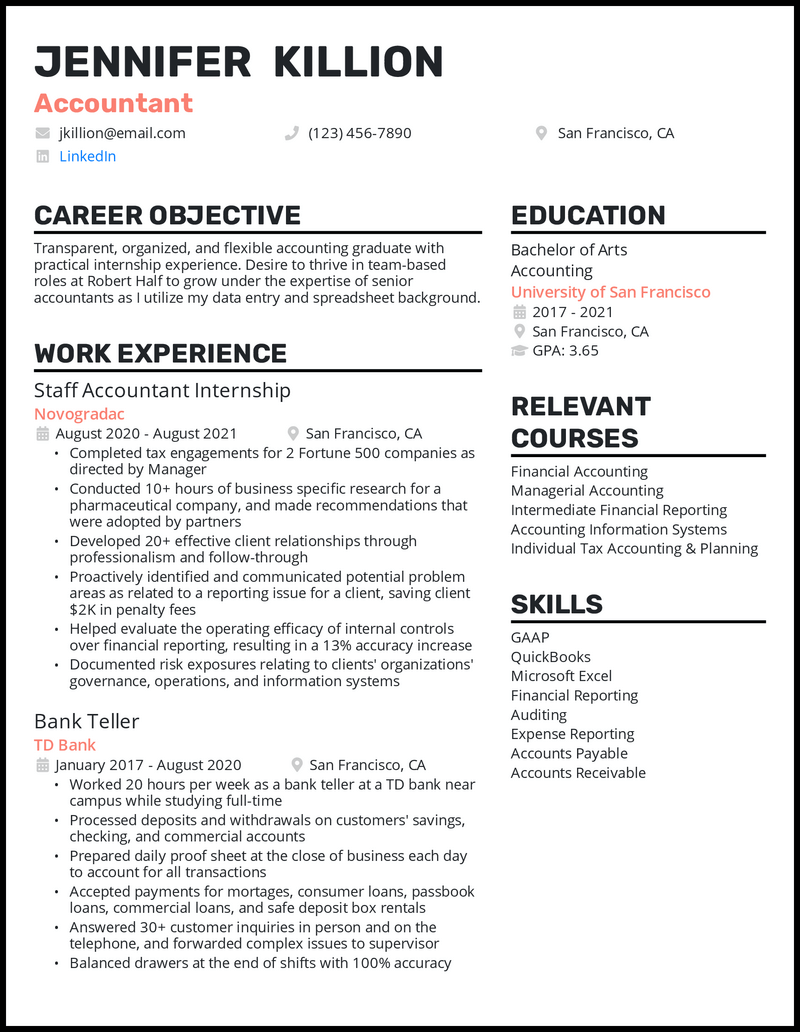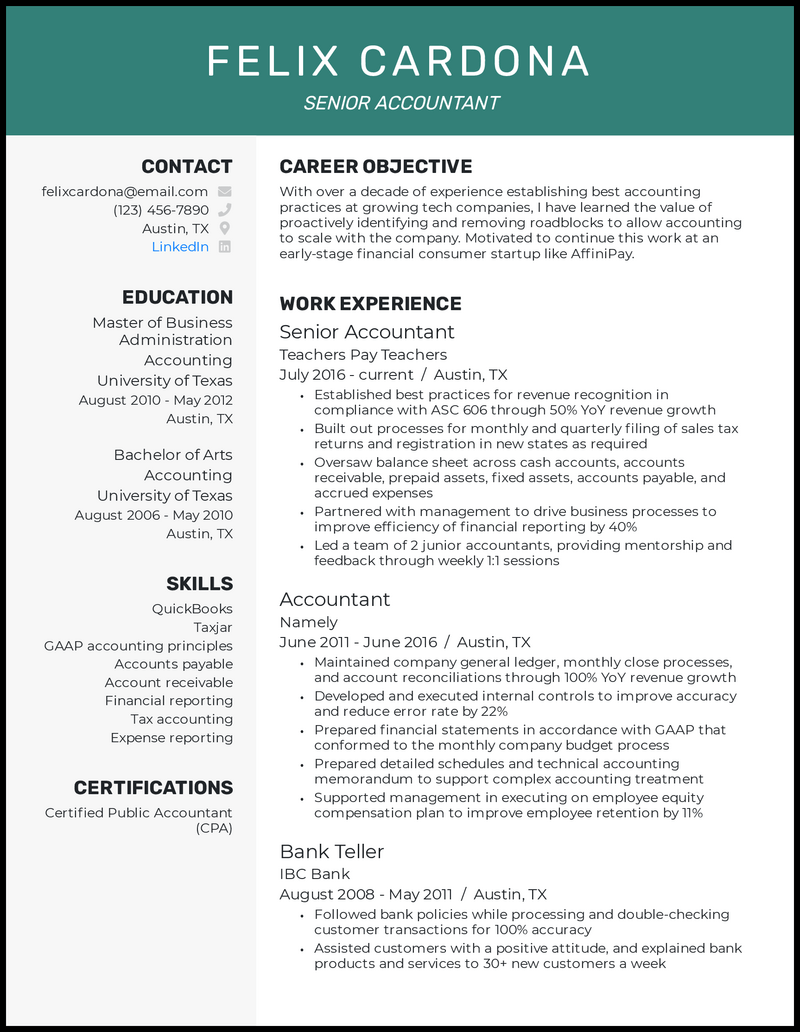

A professional resume like this one communicates a more formal tone, but it’s unique enough to still leave a favorable first impression.
Like this template? Customize this resume and make it your own with the help of our Al-powered suggestions, accent colors, and modern fonts.
A business is only as valuable as its finances, so successful organizations are built on a foundation of solid accounting practices. To be a successful accountant, you need to be diligent, organized, and an expert with numbers and financial data.
However, to get a role as an accountant, you need to rely on a completely different skill set: resume writing. (And let’s not forget about cover letter writing!)
That’s where we come in. We’ve reviewed countless accountant resumes, distilling what works and what doesn’t into 24 accountant resume examples that you can use to help you get your next accounting job in 2024!

























As an accountant, you know that precision matters. You’re expected to be an analytical expert who can produce reliable research and solve complex legal and financial problems. So, think of your resume not only as a place to highlight your experience but also as a place to demonstrate your attention to detail and high standard of work.
Boosting your resume’s potential requires special attention to these four areas:
![]()
When recruiters post an accountant job description, it’s not unheard of for them to receive upwards of 100 resumes. With the sheer number of applicants, companies can’t carefully review every accountant’s application. The applicant tracking system (ATS) software helps weed out applicants before a recruiter reviews them, which saves time and gets rid of candidates without the right experience.
Applicant tracking systems work by using algorithms that match keywords from the company to keywords in your resume. So even if you’re highly qualified for a job, your resume may be thrown out if it doesn’t include the right keywords. To avoid this, you need to know how to include job-appropriate skills on your resume (keywords).
What are the right skills? The right skills will vary depending on the accountant role. Read this excerpt from a sample accountant job description and see if you can pick up on the essential skills:
Greenhill is seeking a certified accountant who can tackle every level of the accounting process, from balancing ledgers to researching the law and analyzing data to ensure efficient and effective operations. This position is ideal for candidates who are jacks of all trades! Must possess strong public speaking and collaboration skills while demonstrating initiative and the capacity to conduct independent work.
Based on this small sample, we can create a list of essential skills customized for the job. You do not want to take exact words from the job description or lie about your skill level. Instead, use the accountant job description as a jumping-off point to think about the most relevant skills you possess:
On other accountant job postings, you can expect to see different skills emphasized, such as:

![]()
It’s not just about what you write on your accountant resume; it’s about how you write it. Your resume format is important for ensuring that your resume is visually appealing, easy to read, and easy for the ATS to recognize. For these reasons, we always suggest the reverse-chronological format to keep your most recent job experience listed at the top of your resume, but there are some other aspects of resume formatting you need to know.
Here are some other essential elements of resume formatting that you should pay attention to:
Remember these formatting tips, and you’ll be confident that your resume is ATS-friendly and easy to read for recruiters.
![]()
All right, back to the objective and summary. A resume objective is one of the most misunderstood sections of your resume. Most people think objectives are outdated and pointless, but that’s only the case if you don’t tailor them and keep them short.
But what exactly is a resume objective? And what’s the difference between that and a resume summary? Let’s dive in!
A resume objective and summary statement are both short, two to three-sentence paragraphs at the top of a resume to express your interest in a position or a brief career synopsis. Both require customization and should be avoided if you don’t plan on writing a new one for every job application.

However, these two types of paragraphs differ in how they communicate interest in the job. An objective describes the value you’ll add to a company and why you want the job. Objectives are best suited to accountants who are just starting their careers or going through a career change (like from a staff accountant to an accounts payable specialist).
A resume summary highlights your past work experience, leveraging it to prove your qualifications and skills. Because the summary relies on many past job experiences, it’s only recommended for senior accountants with many years of industry experience.
Let’s work through a few examples together, so you can better understand all the moving parts:
Poor resume objective: Years of experience in the industry, looking for a full-time job in the accounting field with benefits.
Better resume objective: Detailed junior accountant with 4+ years of experience working for Big Four accounting firms. Seeking an opportunity as a staff accountant at a smaller-scale operation like Fender Co., where my specializations in optimizing pricing through software adoption and systems streamlining would positively impact sales.
Poor summary statement: Experience as an accountant for 3 businesses. My role, which was providing organized, detailed work for all 3 companies, positively impacted the companies.
Better summary statement: Data-driven certified accountant with specialized work in small and mid-size businesses for 22 years. Dedicated to providing services that adhere to GAAP standards while optimizing operations and financial performance. Expertise in many types of accounting software relevant to business size, including Xero, QuickBooks, Zoho, and SAP. Experience supervising and collaborating across cross-functional teams and departments while increasing ROI by 5%+ YTD.
![]()
If you want to prove to a company that you’re an excellent accountant, you’ll want to focus on numbers. Quantifying your impact on your accountant resume provides concrete proof that you’re an asset to the company.
Based on the above, check out these examples that demonstrate how metrics can fuel your bullet points:
![]()
Unfortunately, you can’t just have one copy of your resume that you submit for every accountant job application. Every application deserves a tailored resume.
We know it’s frustrating to focus on customizations when you want to submit multiple applications in a short amount of time. Consider creating a document with a master list of job description bullet points and skills, sorted into groups based on the skills you need to highlight (e.g., one section that demonstrates your accuracy, another for client interactions, another for public speaking, etc.). Then, you can pick and pull things from this document to create fully customized resumes in no time.
For now, we think you’ll find something to help you get started on your accountant resume, no matter the exact role:
![]()
The hardest part of writing your accountant resume is getting started, so congratulate yourself on starting your resume journey! You’re one step closer to creating your best-ever accounting resume. We’ve laid out all the essential tips, including optimizing your skills section, formatting, metrics, and resume customizations, so you can write an amazing resume in no time.
We also have a host of tools to make resume writing easier. See how your resume stacks up against our AI-powered tips. Or, if it’s time to write your resume for the first time, you can use our resume builder with built-in formatting standards and corresponding recommendations to keep the process stress-free, easy, and quick—leaving you time also to craft a killer accountant cover letter for your dream role.
No matter what stage you’re at, we’re here to help, and we wish you the best of success!